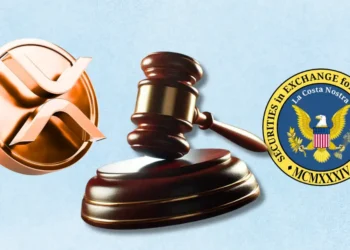Fox Partners With Time to Employ its Blockchain Protocol for Content Verification

Fox Corporation has entered into a partnership with the renowned global media brand Time to leverage Fox’s Verify protocol to establish immutable content licensing and verification.
According to an official press release , the two media giants have collaborated to ensure the authenticity of journalism and combat the spread of misinformation in the press.
Time, as the first external publishing partner for Fox’s Verify protocol, will work alongside Fox to integrate blockchain-based verification into journalism.
“Time is proud to join Fox’s Verify as an authenticated source of fact-based journalism at a time when access to trusted information is more important than ever,” Mark Howard, Chief Operating Officer of Time, said.
What is Fox’s Verify Protocol?
Fox’s Verify protocol was launched on the proof-of-stake (PoS) network of Polygon, a blockchain platform, in January.
The protocol utilizes cryptography to digitally sign and establish the history and origin of digital content.
By bridging the gap between artificial intelligence (AI) platforms and media companies, Verify has successfully verified over 300,000 pieces of content across Fox.
The partnership with Time signifies a significant milestone for Fox’s Verify protocol.
“FOX and TIME are brands that consumers trust, and we look forward to working together to continue to evolve Verify in a way that empowers consumers and content producers and allows this ecosystem to flourish,” Melody Hildebrandt, Chief Technology Officer at Fox Corporation, said.
Fox has announced plans to transition the Verify protocol from the Polygon PoS network to an independent zero-knowledge (ZK) blockchain, utilizing Polygon’s Chain Development Kit (CDK).
This transition, facilitated by Gelato, a decentralized smart contract automation platform, is expected to enhance content verification, making it more secure and open-source.
The adoption of ZK technology will pave the way for exponential growth and enable developers to create projects with authentic provability.
Major Companies Start to Integrate Blockchain
As the adoption of cryptocurrencies and blockchain technology increases, companies across various industries are discovering new ways to integrate them into their operations.
Microsoft was one of the early adopters, beginning to accept Bitcoin for Xbox content and services in 2014 through a partnership with Bitpay.
The company has since started experimenting with blockchain technology, investing heavily in the technology and using it to enhance various aspects of its business operations.
Similarly, giant automobile manufacturer Ford and British multinational oil and gas company Shell are both exploring blockchain technology to improve supply chain management.
Ford aims to use blockchain to track car parts, enhancing logistics efficiency and reducing costs.
Shell is also investigating blockchain for energy trading, which could streamline operations, enhance transparency, and reduce transaction costs.
Japanese multinational conglomerate Sony has also been investing in blockchain technology for gaming and NFTs, enhancing digital asset ownership and security.
Despite the potential benefits, companies adopting cryptocurrencies face significant regulatory challenges.
The regulatory environment for cryptocurrencies is still evolving, with different countries having varying stances on crypto assets.
Disclaimer: The content of this article solely reflects the author's opinion and does not represent the platform in any capacity. This article is not intended to serve as a reference for making investment decisions.
You may also like
Wayfinder Foundation: Users will not be asked to claim PROMPT through unknown links or senders
Florida federal court approves NBA star O'Neal's NFT lawsuit settlement
SEC and Ripple Hit Pause on Appeals, Signaling Potential XRP Settlement
In a major development in the long-standing legal battle over XRP, the U.S. Securities and Exchange Commission (SEC) and blockchain firm Ripple Labs have agreed to pause their respective appeals, paving the way for what many believe could be a final settlement.
